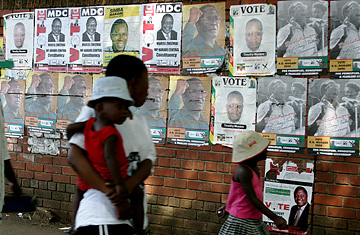
Children walk past posters of Zimbabwean presidential candidates Robert Mugabe, Simba Makoni and Morgan Tsvangirai, in Harare on April 27, 2008.
Could the tide be turning once again in Zimbabwe's post-election crisis? When the authorities declared their intention to recount the ballots in 23 of 210 seats in the election staged more than four weeks ago, opposition activists and foreign observers assumed the intention was to rig the results and maintain the power of President Robert Mugabe and his ZANU-PF party. But the revised result announced on Sunday upheld the historic victory of the Movement for Democratic Change in the parliamentary election, meaning Mugabe's party has lost control of the legislature for the first time in Zimbabwe's 28-year history. Although the results of the balloting for the presidency continue to be withheld, the opposition is clearly feeling the wind at its back: After several weeks of bloody suppression at the hands of security forces and militias associated with the ruling party, the MDC announced Monday that it had overcome a split in its ranks that had resulted in rival slates of candidates, thus adding strength to its parliamentary gains.
"Old man, go and have an honourable exit," taunted opposition leader Morgan Tsvangirai at a press conference announcing his reconciliation with opposition rival Arthur Mutambara, urging Mugabe to end his 28-year rule. Bold words for a man who has been beaten and jailed for his opposition to Mugabe, although they were spoken not in Zimbabwe, but in the South African city of Johannesburg, where the opposition leader has been courting support for demands that the election results be immediately released. Tsvangirai may, in fact, be on the verge of making a triumphant return home. On Tuesday, electoral officials are at last expected to announce the results of the presidential poll, which Tsvangirai insists that he has won by a margin greater than the 50% majority he needs to avoid a runoff race against Mugabe.
The imminent release of the results may be a result of increasing pressure from African leaders to resolve the crisis. And although analysts had expected that after the four-week delay, the result would give Mugabe a razor-thin majority, forcing a run-off that the ruling party would then try to win through violent intimidation, the fact that the recount upheld the opposition parliamentary victory may have revised pessimistic expectations. "I think it's going to be very difficult for them to announce anything other than a Tsvangirai win tomorrow," Zimbabwean human rights activist Elinor Sisulu told TIME from South Africa, where she is based. "If they announce a win for Mugabe it's just not going to be accepted."
According to Sisulu, the opposition's gains in parliament have forced a crack that cannot be resealed in Mugabe's power structure. This will be the first time since independence from Britain in 1980 that ZANU-PF has not controlled Parliament. "This is a very precarious and dangerous situation now," she says.
Yet if Tsvangirai is pronounced the winner on Tuesday, the political violence that has gripped the country over the past month could escalate rather than abate, because commanders of the security forces have vowed never to yield to opposition rule. The MDC claims that 15 of its supporters have been killed, and hundreds more beaten, tortured and evicted as ZANU-PF attempts to assert its authority in rural areas and MDC strongholds. Outside observers concur that political violence is increasing. On Monday, the 215 opposition supporters rounded up in a raid on MDC offices in Harare on Friday — many of them injured party workers from elsewhere — were still being held, despite an international outcry.
The crackdown may have put opposition activists on the defensive at home, but pressure has been mounting on President Mugabe's government from outside. U.S. Assistant Secretary of State Jendayi Fraser said last weekend that the U.N. should consider imposing sanctions on Zimbabwe unless the violence ceases. Unions, civil society and church groups from around the region have also rallied to support Zimbabwe's opposition, successfully preventing a Chinese weapons shipment bound for Zimbabwe from reaching the landlocked country by refusing to offload it in southern African ports. And the reunification of the opposition has supporters hopeful. "This was the moment for them to reunite, because the disagreement between them was always about how to get rid of Mugabe," says Sisulu. "So now that the electorate has spoken, there's no reason for their differences." Still, whatever the outcome of the election, ZANU-PF is showing little sign of meekly accepting the verdict of the electorate. Last Friday, a South African newspaper reported that Angolan President Eduardo dos Santos, a longtime Mugabe ally, was ready to send his troops to the Zimbabwean ruler's aid if necessary. And if the results announced on Tuesday require a runoff vote, the violence and intimidation currently being meted out on opposition supporters could keep voters away from the polls — and yet steal victory from Tsvangirai.
